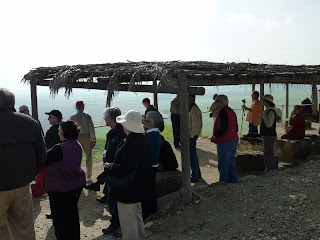Megiddo has been the focus of many conflicts; it has been called the battlefield of the nations. Prophets predicted that it would be the place where nations will have the final conflict at the coming of the Messiah (Rev. 16;14-21). Capturing Megiddo is as good as capturing a thousand cities because of megiddo’s strategic location at one of the key entrances to the Jezrell Valley. Like Jericho, a city has been built upon city at Megiddo. Megiddo was fortified by King Solomon in the 10th century BC (1Kings 9:15). There are many impressive ruins, Solomon’s stables, a water cistern, and a 215 foot underground tunnel. After going through the tunnel, climbing extra steps due to a hazardous spill on the other side of the tunnel (183 steps noted on the sign - Dennis counted 185.5 steps), we heard scriptures from Revelation 16:12-16 and 21:1-5. Napoleon is to have said this would be the greatest battlefield of all. It is relatively flat and you can see for mile and miles and miles.
And yes, the stairs are as steep as they look!




 <
<

Mount Carmel is a mountain range in northwestern Israel near the Mediterranean coast. According to the Old Testament, Elijah defeated the priests of Baal at Mount Carmel. A statue of the Prophet Elijah stands at the courtyard of the Carmelite Sanctuary and Convent at the Muhraka. While here we sat in the grove and heard the story of Elijah from 1 Kings 18:1-46: Elijah;s message to Ahab, Elijah’s Triumph over the Priests of Baal. We heard the story in the grove outside, went inside the small chapel with amazing acoustics and sang and sang.




We ate lunch in a Druze village where we enjoyed fresh vegetables and salads, chicken schnitzel and falafel.
In Israel, the majority of the approximately 120,000 Druze consider themselves a distinct religious group. Since 1957, the Israeli government has also designated the Druze a distinct ethnic community, at the request of the community's leaders.
A minority of the Druze in the Golan region, controlled by Israel since the Six-Day War of 1967 and officially annexed by Israel in 1981, but not internationally recognized, have a separate legal status from those in the Galilee region, and are considered permanent residents under the Golan Heights Law of 1981. Few of them have accepted full Israeli citizenship, and the majority are citizens of Syria Druze in the Golan are not drafted into the Israeli army (although a minority serve voluntarily) and many travel to Syria regularly to visit family or receive university degrees in Damascus. A year after Israel annexed the Golan, on April 14, 1982, the Druze communities around Mt. Hermon launched a six-month non-violent general strike in protest of Israel's annexation of the Golan.
The rest of the Druze population are citizens of Israel. Druze citizens are prominent in the Israel Defense Forces and in politics. A considerable number of Israeli Druze soldiers have fallen in Israel's wars since the 1948 Arab-Israeli War. The bond between Jewish and Druze soldiers is commonly known by the term "a covenant of blood" (Hebrew: ברית דמים, brit damim), although in recent years the phrase has been criticized as the Israeli government has been accused for failing to open up employment opportunities to Druze youth outside of the army. http://en.wikipedia.org/wiki/Druze
Caesara is an ancient seaport on the Mediterranean Sea. It was founded in 22 BCE by King herod the Great and named it in honor of Caesar Augustus. There are many ancient ruins, including an amphitheater, which is still used today for concerts. There are also remains of an aquaduct which provided water to the city. Apostle Paul used Caesarea as a port city and Peter also was in ministry here. The stories told were from Acts 10:1-44 (The story of Peter and Cornelius and how the Gentiles hear the good news) and Acts 1-18 (Peter’s report to the churches in Jerusalem).
While the historical biblical perspective of Caesarea is important, I must admit what I enjoyed most was walking along the shores of the Mediterranean Sea.











Day 5 as we enter Jerusalem will be covered in the next entry.

No comments:
Post a Comment